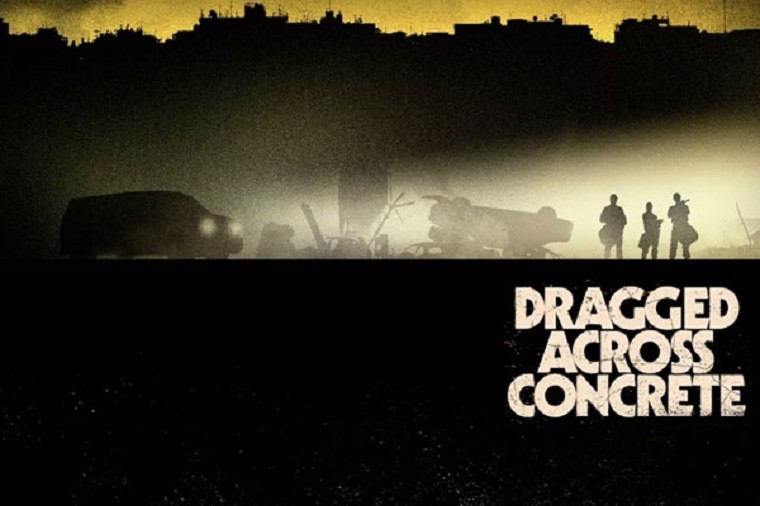Describe This Movie In One Who Framed Roger Rabbit? Quote:
JESSICA RABBIT: I'm not bad, I'm just drawn that way.
Brief Plot Synopsis: Disgraced cops and ex-con cross paths during ill-advised ripoff.
Rating Using Random Objects Relevant To The Film: 2.5 egg salad sandwiches out of 5.
Tagline: "Those who can't earn a living must find another way to provide."
Better Tagline: "Does this mustache make me look racist?"
Not So Brief Plot Synopsis: Henry Johns (Tory Kittles) just got out of prison and wants to do things right by his mom — who's taken to tricking to pay the bills — and his wheelchair-bound little brother Ethan. Meanwhile, officers Ridgeman (Mel Gibson) and Lurasetti (Vince Vaughan) are in hot water after getting caught roughing up a suspect. Financial considerations (Ridgeman's wife has MS, Lurasetti wants to build a stable future with his girlfriend) steer the three onto a collision course with some gold thieves even more brutal than they are.
"Critical" Analysis: Like writer/director S. Craig Zahler's previous films (Bone Tomahawk, Brawl in Cell Block 99), Dragged Across Concrete tells the story of violent men in violent circumstances. When we first meet Henry Johns, he's threatening to beat one of his mother's johns with a bat. Meanwhile, our two cops get suspended when Ridgeman is caught on a cell phone camera while grinding a guy's face with his boot as Lurasetti looks on.
That's ... problematic, but doesn't go unpunished. Their boss Lieutenant Calvert (a bored Don Johnson), calls them on the carpet, but it's less for their abuse than the fact they were filmed in the act. In this same scene, we're treated to musings about the "intolerance" of the media while Calvert compares being called a racist in the 2010s with being labeled a communist in the 1950s.
That's ... bad. On one hand, the whole screed comes across like Zahler is trolling everyone who called out his previous (critically acclaimed) works for their problematic stances on race (maybe they should be ridiculing him for continuing to present Vince Vaughn as a bad ass). On the other, the whole exchange is played straight, establishing these as the genuine viewpoints of our "protagonists."
There's a perverse symmetry to casting Gibson, a homophobic bigot who was once recorded screaming at his wife about getting raped by [blacks], as a homophobic bigot whose wife worries about their newly "womanly" daughter getting raped by local black teenagers (at least she didn't call them a "pack")? It's also staggeringly tone-deaf, even if Zahler did it in order to own his critics, or whatever.
The trolling excuse also ignores the fact the Ridgeman family's plight is largely the fault of the poor disciplinary record that's kept dad the same rank for 30 years. And sure, Lurasetti has a personal code he invokes to prevent going too far over the line, but he also jokes about always ordering the "dark roast" on MLK's birthday.
It's all the more maddening because Zahler's movies are otherwise very good, They have a distinctive visual palette (aided here by cinematoghrapher Benj Bakshi's plentiful shadows) and pacing that sets them apart from mere exploitation fare. The stakeout scenes in Dragged are often hilarious, and Gibson and Vaughn have real chemistry, with a shorthand vocabulary that hints at genuine friendship. You believe these really are two guys who cook out on the weekends and go to the fights.
Something real men do, god damn it.
Like Brawl, Dragged is a slow burn. At 2 hours and 41 minutes, probably too slow. But Zahler knows how to build tension, whether in a climactic sniper standoff scene or anything involving Zahler alumnus Jennifer Carpenter's character, a new mother returning to work who becomes hopelessly caught up in events. Unfortunately, her inclusion ends up feeling like a justification for further sadism.
On one hand, Dragged Across Concrete is an engrossing cop thriller, despite the runtime. Kittles is great, and Mel Gibson's performance might have people talking awards if it wasn't, you know, Mel Gibson. On the other, and as Lt. Calvert remarks at one point, "politics are everywhere." Officer Ridgeman is a man left behind by his inability to adapt to the present, and the jury's out on whether the same thing will happen to Zahler.
You don't need a film historian to point out despicable lead characters in movies directed by everyone from Don Siegel to Sam Peckinpah to William Friedkin. Depiction is not endorsement, fine, but Zahler goes back to this well enough to make us reconsider further indulging his clear talents for filmmaking.



